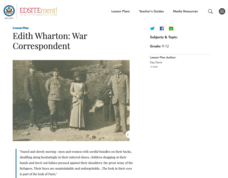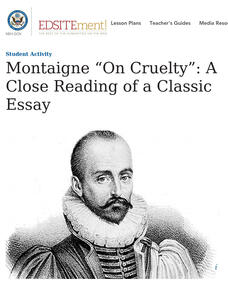National Endowment for the Humanities
Poems that Tell a Story: Narrative and Persona in the Poetry of Robert Frost
Dig in deeper with Robert Frost's, "Stopping by Woods on a Snowy Evening." Learners will read and discuss poems by Robert Frost and learn the meaning of terms such as narrative and personal. They journal, collaborate, and present poetry...
National Endowment for the Humanities
Shakespeare's Julius Caesar: Leadership and a Global Stage
Shakespeare's Julius Caesar is, among other things, the study of a ruler's ambitions. Young scholars watch videos, read articles, and keep a Commonplace Book while studying the play. At the end of Act III, pupils stage the play that...
National Endowment for the Humanities
"From Citizen, VI [On the Train the Woman Standing]," Claudia Rankine
Claudia Rankine's poem "From Citizen, VI [On the Train the Woman Standing]," asks readers to consider direct and more subtle forms of prejudice. After discussing the format of the poem, its tone, and the emotions expressed, class members...
National Endowment for the Humanities
Edith Wharton: War Correspondent
Students research how the field of war correspondence has evolved. Young historians read chapter's from Edith Wharton's book Fighting France, From Dunkerque to Belfort. Students investigate an American correspondents' experiences during...
National Endowment for the Humanities
Women's Suffrage: Why the West First?
Eleventh graders discuss the granting of voting rights to women in several Western states. They take a stand, supported by historical evidence, as to whether or not a single theory explains why Western states were the first to grant full...
National Endowment for the Humanities
Remember the Ladies: The First Ladies
Young historians name at least five First Ladies, describe something significant each did, and state five traditional duties of First Ladies. They discuss some untraditional things First Ladies have done as well.
National Endowment for the Humanities
Montaigne “On Cruelty”: A Close Reading of a Classic Essay
An excerpt from Michel de Montaigne's essay "On Cruelty" provides advanced readers an opportunity to polish their close reading skills. Scholars read the passage twice and then respond to the provided questions.
National Endowment for the Humanities
Frances Ellen Watkins Harper’s “Learning to Read”
Frances Ellen Watkins Harper's poem "Learning to Read" is the focus of a lesson plan that teaches middle schoolers how to do a close reading of a text. The lesson plan introduces them to a brief biography of the poet, includes a video...
National Endowment for the Humanities
"Sí, se puede!": Chávez, Huerta, and the UFW
"Sí, se puede!" Cesar Chavez and Dolores Huerta believed organizing farm workers and changing their working conditions were possible. Scholars examine provisions of the Bracero Program, videos, and the United Farm Workers' (UFW) work....
National Endowment for the Humanities
Navigating Modernism with J. Alfred Prufrock
Learners explore the role of the individual in the modern world by closely reading and analyzing T.S. Eliot's "The Love Song of J. Alfred Prufrock."
National Endowment for the Humanities
García Márquez’s Nobel Prize Speech: “The Solitude of Latin America”
To conclude a study of One Hundred Years of Solitude, class members analyze Gabriel Garcia Marquez's Nobel Prize in Literature acceptance speech. After a whole-class discussion of the main ideas in the speech, individuals draft a...
National Endowment for the Humanities
The Realism in Magical Realism
A lesson on magical realism has young historians research how Garcia Marquez weaves historical events and his own experiences into One Hundred Years of Solitude. Using historical records and information found in a biography of Garcia...
National Endowment for the Humanities
Magical Elements in Magical Realism
How does Gabriel Garcia Marquez make the magical elements of his novel appear so real? That's the challenge facing readers of One Hundred Years of Solitude. Scholars examine the tone and descriptive details Garcia Marquez uses to make...
National Endowment for the Humanities
The Metamorphoses and Later Works of Art: A Comparison of Mythic Imagery
In a lesson on The Metamorphoses, scholars compare how graphic artists use mythic imagery to represent Ovid's tales. Each group selects a work of art paired with Ovid's version of a myth and compares how both present the story.
National Endowment for the Humanities
The Metamorphoses and Modern Poetry: A Comparison of Mythic Characters
To gain an appreciation of the power of point of view, class members compare Ovid's version of the myth of "Orpheus and Eurydice" with that used by H.D. in her poem, "Eurydice." Individuals then craft a reflection in which they use...
National Endowment for the Humanities
The Metamorphoses and Genesis: A Comparison of Creation-Flood Stories
Creation and destruction. Scholars use a Venn diagram to compare the creation story in Ovid's The Metamorphoses with that in the book of Genesis. Pupils then note differences between the two texts and offer suggestions for why the texts...
National Endowment for the Humanities
“The Great Migration” by Minnie Bruce Pratt
Minnie Bruce Pratt's poem, "The Great Migration," offers young scholars an opportunity to reflect on how where we come from influences who we are. Groups conduct a close reading of the poem, recording observations about the poem's...
National Endowment for the Humanities
“Every Day We Get More Illegal” by Juan Felipe Herrera
A study of Jan Felipe Herrera's poem "Every Day We Get More Illegal" opens the door for a discussion on immigration. To begin, class members examine the photograph "Desert Survival," record their observations of the image, and then...
National Endowment for the Humanities
The Glass Menagerie: Impact of Expressionism
Young scholars are challenged to write a realistic analysis of Tennessee Williams' nonrealistic memory play, The Glass Menagerie. Writers use the evidence gathered on their worksheets to craft an effective thesis and concluding statement...
National Endowment for the Humanities
The Glass Menagerie: Key Themes
Using the list of expressionist techniques generated in the first instructional activity, groups analyze how Williams uses these techniques to develop one of the play's themes. The whole class then shares and discusses the examples they...
National Endowment for the Humanities
The Glass Menagerie as Expressionist Theatre
The first lesson in a three-part unit has high schoolers examine The Glass Menagerie as an example of expressionist theatre. After reading a short article about expressionism, scholars list expressionist techniques in Tennessee Williams'...
National Endowment for the Humanities
Societal Schisms and Divisions
The final lesson in the Crime and Punishment unit looks at the societal injustices depicted in Dostoyevsky's novel. Scholars examine the schisms between men and women, between wealth and poverty, between religion and skepticism, and...
National Endowment for the Humanities
Man and Superman
Ordinary and extraordinary readers will find much to contemplate in a instructional activity on Crime and Punishment as they examine the dichotomies in Dostoevsky's novel. Scholars reflect on Raskolnikov's theory that extraordinary...
National Endowment for the Humanities
Dostoevsky's Crime and Punishment
Pain and suffering do not have to be inevitable in a study of Crime and Punishment. A carefully scaffolded lesson introduces readers to the divided natures of the characters in Fyodor Dostoevsky's complex novel. Groups use the provided...




!["From Citizen, VI [On the Train the Woman Standing]," Claudia Rankine Lesson Plan "From Citizen, VI [On the Train the Woman Standing]," Claudia Rankine Lesson Plan](http://content.lessonplanet.com/resources/thumbnails/456347/large/u2nyzwvuc2hvdf8ymdizltazlte3x2f0xzeyljexljq2x1bnlnbuzw.png?1679080322)




















